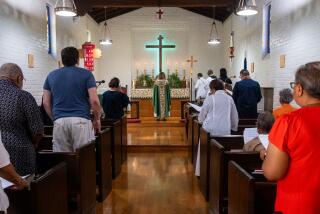Why don’t we allow religion to evolve?
It was fascinating to read the responses to “Letting Doubters in the Door,” my Sunday Op-Ed on the “nones” -- those who answer “no religious affiliation” when asked by pollsters -- and a new open approach to religion and spirituality in the United States today. The responses nicely mirror the two major reactions that those of us working in the “emerging church” are seeing across the country, from more conservative or traditional believers on the one side and from anti-religious folks on the other.
We call a person “conservative” when he or she seeks to conserve qualities from the past. There is nothing inherently wrong about this approach. For some conservatives, however, this desire becomes the conviction that all change is bad. Some say, “We possess the truth; we (or the Bible or the church) got all of it right centuries ago. Take it or leave it.” Of course, this becomes a bit more vicious when “take it” means heaven and “leave it” means hell! I presume this is what “Drive-By” meant when he or she wrote, “You take the Spiritual road, and I’ll take the Religious road, and I’ll be in heaven before you.”
“Drive-By” may also believe that the consequences of “leave it” are gross immorality. As “edwardskizer” puts it (with minor corrections of punctuation):
“I suppose it’s a lot easier to live with a religion that will exist according to your whims and interests rather than living with one where you have to obey its religious practices and beliefs. You can make up the rules (if any) at your own convenience. Lazy? Just think to yourself “my religion does not prohibit stealing.” Horny? Hey, my neighbor’s wife is available. Don’t like your neighbor? Murder him, just don’t get caught. God serves you, not the other way around.”
Statistics do not bear this out. Atheists, for example, have lower divorce rates than those who espouse a religion. And the least religious countries (such as the Scandinavian countries) often have the lowest levels of crime and corruption, the best educational systems, the strongest economies, free healthcare for all and other indicators of concern for the common good.
This, of course, plays into the hands of the other group of readers who insist that only anti-religious responses are acceptable. Thus “saylors2112” writes:
“What Mr. Clayton is proposing already has a name -- Humanism. What’s so sad and pathetic is that you propose throwing your whole belief system under the bus to stay relevant. Once you start pulling the thread, your whole ball of yarn unravels. To prevent that, you propose to water down and re-brand organized religion so that it appeals to both the atheists and those currently walking away from the church. You’ve missed the point of the ‘nones’ -- we never wanted your system in the first place. We don’t want the hip version either.”
What’s interesting is that the opponents on both sides share a common assumption: Religion can only be what it has always been. Change is unacceptable. But why should we accept that assumption? Haven’t humans always brought their own values to their quest for God? Haven’t we always sought to make our belief systems relevant? Each new development in science, philosophy and culture calls for rethinking our faith (or our nonfaith) -- no matter what we happen to believe. Isn’t it a good thing, for example, to try to purify our religions from inherited racism or sexism or Eurocentrism?
By contrast, I believe that human understanding of spiritual matters can and does develop over time. “Say yes to Jesus” can take many forms. At Claremont School of Theology, we study and learn from the myriad forms of Christian belief and practice across the centuries. Only in this way can we educate a new generation of leaders -- men and women who are finding powerful new expressions of Jesus’ radical way of compassion. Their new communities may not look like the traditional church, but should we simply dismiss them on those grounds?
At the end of the day, we shouldn’t be surprised that we disagree about questions of ultimate reality -- within religions, between religions and outside of religion altogether. To more and more of us today, what matters is what we do when we encounter differences like these. Can we live with less intolerance and hatred toward those with whom we disagree? Can we honor the diverse forms of the human spiritual quest? Jesus will inspire some of us, the Buddha will inspire some, and the great humanist texts will inspire others. You may walk a different path than I do. But if both paths deepen our capacity for compassion, isn’t that a cause for rejoicing?
ALSO:
Church-state wall: For America and religion
Science and religion: God didn’t make man; man made gods
Pope Benedict XVI ends Latin visit with call for freedoms in Cuba
Philip Clayton is the dean of the Claremont School of Theology and the provost of Claremont Lincoln University.
More to Read
A cure for the common opinion
Get thought-provoking perspectives with our weekly newsletter.
You may occasionally receive promotional content from the Los Angeles Times.






